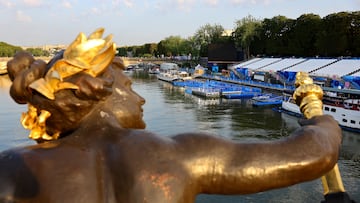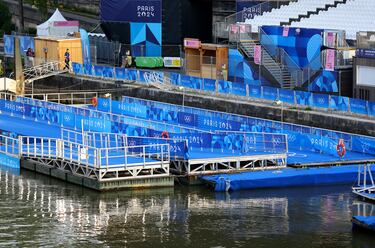Seine polluted: what happens if triathlon swimming leg can’t take place? Alternatives
The pollution levels of the French capital’s emblematic river have once again caused headaches and problems for the Olympic Games hosts and organizers.


Initially scheduled for Tuesday, Olympic officials announced that the men’s triathlon at the Paris 2024 Olympics had been postponed to Wednesday due to poor water quality levels in the River Seine. The infection-causing bacteria like E.coli levels are too high for athletes to compete safely, and the race organizers were coerced to abandon today’s date and look for a different solution,

The water in the Seine River, the site of the Olympic triathlon competition, is being tracked daily. The crucial tests to determine whether or not the swim will happen are carried out at 3:30 a.m. on race morning, where the enterococci must not be more than 200 parts per 100ml, and E. coli not more than 500 parts per 100ml.
What alternatives are safe competition alternatives if the bacteria levels are still high?
Changing race dates
The first step in managing the crisis at the Olympic triathlon competitions will be to delay them and have them on the same day (men’s and women’s individual). If either the men’s or women’s race cannot take place due to a failed test, the event will be rescheduled to Friday, August 2. If both races are postponed, they will both take place on August 2.
In this scenario, the men’s race will start at 8 a.m., and the women’s race will follow promptly to ensure the Seine is open for river traffic by midday. Following the races, both medal ceremonies will take place to honor the winners.
The scheduled fortuity day for the mixed team relay has been set for August 6, providing a one-day buffer in case of any unforeseen circumstances. This adjustment allows for a 24-hour period for bacteria levels in the area to decrease, ensuring the safety and well-being of all participants.
Duathlon
Organizers have vehemently denied any possibility of relocating despite persistent rumors and suggestions, including a move to the French Riviera in Nice, the cradle of modern triathlon and the host city of one of the biggest IRONMAN triathlons in the calendar.
However, suppose the water contamination levels are still out of commission on the postponed dates. In that case, the worst-case scenario will prevail, which means the duathlon format will be used for the competitions.
In a duathlon format, the individual races would consist of a 5km run instead of a 1.5km swim and a 300m swim instead of a 1km run for each leg of the two-man and two-woman relay. This format was demonstrated in the Paris Test Event last year.
Related stories

Paris 2024 day four: what's on?

“When the Olympics are over, I’ll make the decision I need to”
Having an outdoor sport at an event of this magnitude always brings a risk that something like this can happen. This is especially true in triathlons, where canceling the legs of the race is common for different reasons, such as lightning, currents, fog, high wind, and severe weather events.
Even Eric Noel, the technical operations manager for the Olympic triathlon event, has the experience, having been in charge of Montreal’s World Triathlon Championship Series event in 2022 when the swim was aborted, has confirmed to La Presse: “If there is any doubt, there will just be no swimming.”
Complete your personal details to comment